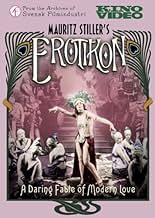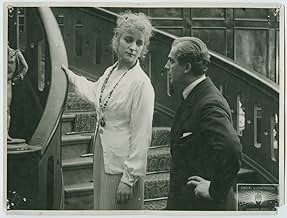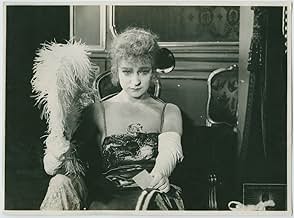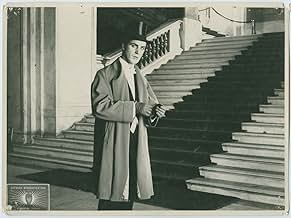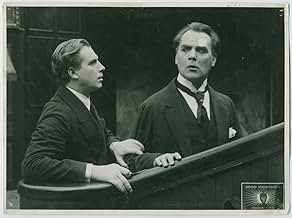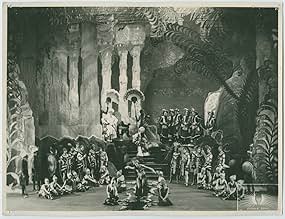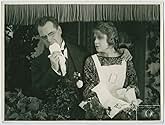PUNTUACIÓN EN IMDb
6,4/10
1,1 mil
TU PUNTUACIÓN
Irene, la esposa aburrida de un entomólogo distraído, persigue a un aviador mujeriego, el mejor amigo de su marido. Mientras tanto, su marido parece volverse inusualmente cercano a su propia... Leer todoIrene, la esposa aburrida de un entomólogo distraído, persigue a un aviador mujeriego, el mejor amigo de su marido. Mientras tanto, su marido parece volverse inusualmente cercano a su propia sobrina.Irene, la esposa aburrida de un entomólogo distraído, persigue a un aviador mujeriego, el mejor amigo de su marido. Mientras tanto, su marido parece volverse inusualmente cercano a su propia sobrina.
- Dirección
- Guión
- Reparto principal
Reseñas destacadas
A professor has a bit of an infatuation with his niece; the professor's wife, a cosmopolitan lady of leisure, takes up with a flashy aviator, mainly, it seems, to torment a sculptor who loves her; turn up the heat, stir, and wait for the boil...
The DVD release's jacket does a mild disservice to Mauritz Stiller's Erotikon (1920) by stating that its slyly sardonic approach to sexual intrigue inspired Ernst Lubitsch. As the only Lubitsch film I've seen that predates Erotikon is the preposterous and galumphing Eyes of the Mummy, I'm prepared to accept that Lubitsch had a significant epiphany that helped him become the sort of filmmaker who could make The Marriage Circle. But the expectation is thus set that Erotikon will have an effervescent comic pace and a constantly winking eye like a Lubitsch film of the 30s-- and that is not the case.
A better touchstone for the film is The Rules of the Game (not least because an aviator plays so prominent a role), a movie which observes, with the sad empathy of a veteran priest with many Saturdays spent listening to confession behind him, the desperate efforts of a group of humans to chase after happiness-- only to make things worse in most cases. Erotikon begins with a fussy middle-aged professor lecturing on bigamous beetles (oddly anticipating the recent movie biography of Dr. Kinsey), and takes a consciously scientific detachment toward its characters as they scurry about, trying to keep mortality at bay by finding some form of erotic excitement in lives which are a bit too settled, under-occupied and, it appears, sexually frustrated. A comedy, yes, and even one that wraps up in high spirits, and yet a comedy that's touched throughout by melancholy, and played with a sort of gravity and a deliberate pace that gives us time to feel the hurt under the surface.
Or so it seemed to me when I watched it tonight. Then I watched the "intro" by the film scholar Peter Cowie, and learned that Erotikon is quite the opposite. Unlike Smiles of a Summer Night, another obvious comparison, Erotikon's comedy does not have a moralistic melancholy undertone, says Cowie. What struck me as gravity, like Preston Sturges slowed down to Douglas Sirk if not Carl Dreyer, strikes Cowie as "frothy."
How to account for the fact that Cowie sees a completely different Erotikon than I do? Well, for one thing, I suppose he has far more experience of Scandinavian cinema on which to build his preconceptions; next to a diet of Sjostrom, Bergman, Strindberg and Hamsun, Erotikon IS frothy, I'm sure. And I doubt he had seen it, the first few times at least, with the particular score on this DVD, a Celtic dirge that seems to belong to a production of "The Death of Cuchulain" more than it does to a 1920s drawing room comedy; it certainly puts the film in a dourer key than a conventional romantic comedy score would have. Maybe I'll try watching it again with something peppier, and see if it's a different movie.
Adding to the uncertainty of tone is the fact that the film contains a wide variety of acting styles. Tora Teje (as the socialite wife) and Lars Hanson (as the sculptor) are highly effective in a theatrical, heightened-naturalism sort of way, while Anders de Wahl as the husband and especially Torsten Hammaren as an aged professor who seems to be the Swedish answer to Mr. Muckle in It's a Gift are caricatures of woolly-headed academia. It's a bit like Deborah Kerr in Bonjour Tristesse being married to Fred MacMurray in The Absent-Minded Professor.
Despite this mismatch-- perhaps to be expected in such a trailblazing comedy with no apparent models to follow, other than its stage original-- Erotikon is a striking and interesting film, one of the few silents that seems to leap out of the period, untouched by the customary moralizing Victorian preconceptions of what is proper behavior for its characters (and proper punishment for those who violate it). Erotikon simply observes what these creatures do naturally; applying morals to them would be self-delusion, and Erotikon is a movie largely free of illusions.
The DVD release's jacket does a mild disservice to Mauritz Stiller's Erotikon (1920) by stating that its slyly sardonic approach to sexual intrigue inspired Ernst Lubitsch. As the only Lubitsch film I've seen that predates Erotikon is the preposterous and galumphing Eyes of the Mummy, I'm prepared to accept that Lubitsch had a significant epiphany that helped him become the sort of filmmaker who could make The Marriage Circle. But the expectation is thus set that Erotikon will have an effervescent comic pace and a constantly winking eye like a Lubitsch film of the 30s-- and that is not the case.
A better touchstone for the film is The Rules of the Game (not least because an aviator plays so prominent a role), a movie which observes, with the sad empathy of a veteran priest with many Saturdays spent listening to confession behind him, the desperate efforts of a group of humans to chase after happiness-- only to make things worse in most cases. Erotikon begins with a fussy middle-aged professor lecturing on bigamous beetles (oddly anticipating the recent movie biography of Dr. Kinsey), and takes a consciously scientific detachment toward its characters as they scurry about, trying to keep mortality at bay by finding some form of erotic excitement in lives which are a bit too settled, under-occupied and, it appears, sexually frustrated. A comedy, yes, and even one that wraps up in high spirits, and yet a comedy that's touched throughout by melancholy, and played with a sort of gravity and a deliberate pace that gives us time to feel the hurt under the surface.
Or so it seemed to me when I watched it tonight. Then I watched the "intro" by the film scholar Peter Cowie, and learned that Erotikon is quite the opposite. Unlike Smiles of a Summer Night, another obvious comparison, Erotikon's comedy does not have a moralistic melancholy undertone, says Cowie. What struck me as gravity, like Preston Sturges slowed down to Douglas Sirk if not Carl Dreyer, strikes Cowie as "frothy."
How to account for the fact that Cowie sees a completely different Erotikon than I do? Well, for one thing, I suppose he has far more experience of Scandinavian cinema on which to build his preconceptions; next to a diet of Sjostrom, Bergman, Strindberg and Hamsun, Erotikon IS frothy, I'm sure. And I doubt he had seen it, the first few times at least, with the particular score on this DVD, a Celtic dirge that seems to belong to a production of "The Death of Cuchulain" more than it does to a 1920s drawing room comedy; it certainly puts the film in a dourer key than a conventional romantic comedy score would have. Maybe I'll try watching it again with something peppier, and see if it's a different movie.
Adding to the uncertainty of tone is the fact that the film contains a wide variety of acting styles. Tora Teje (as the socialite wife) and Lars Hanson (as the sculptor) are highly effective in a theatrical, heightened-naturalism sort of way, while Anders de Wahl as the husband and especially Torsten Hammaren as an aged professor who seems to be the Swedish answer to Mr. Muckle in It's a Gift are caricatures of woolly-headed academia. It's a bit like Deborah Kerr in Bonjour Tristesse being married to Fred MacMurray in The Absent-Minded Professor.
Despite this mismatch-- perhaps to be expected in such a trailblazing comedy with no apparent models to follow, other than its stage original-- Erotikon is a striking and interesting film, one of the few silents that seems to leap out of the period, untouched by the customary moralizing Victorian preconceptions of what is proper behavior for its characters (and proper punishment for those who violate it). Erotikon simply observes what these creatures do naturally; applying morals to them would be self-delusion, and Erotikon is a movie largely free of illusions.
Though critically acclaimed, this 1920 film is interesting only from a historical perspective. It was directed notably by the great Swedish director Mauritz Stiller (he was actually a Jew from Finland), who had already directed dozens of films and was a master of his craft. Although he was yet to create his masterpiece The Saga of Gosta Berling, he would only direct a handful of films before his failed residency in Hollywood and premature death in 1928. Also worthy of mention is the film's male lead, a premiere Swedish actor, Lars Hanson, who would famously star several times with Stiller's great discovery Greta Garbo. Erotikon, though, scarcely lives up to its salacious title. It may have been somewhat daring in 1920, but today it is less apt to raise eyebrows than to close eyelids. There must have been a hundred silent features that would deal more compellingly with the theme of the errant wife and the dull husband. While there is no question Stiller has grasped the art of motion picture making -- the acting and camera-work and editing are polished and some of the title cards are witty, artistically the film is a disappointment. Even for one accustomed to the conventions of silent films, it is painfully slow and devoid of arresting incident. Only the unconventional ending (which I won't divulge) somewhat saves it. And the nicely restored Kino version unhappily features a musical score which does little to arise audience interest or connection to the plot. Its atrocious fiddle-scraping may be apt for the contemplation of suicide, but after a half hour or so its annoying discordance becomes unbearable and anyone of auditory sensibilities will soon be reduced to viewing this feature in grateful silence.
Anders de Wahl is a distinguished entomologist writing papers about the polygamous lives of beetles. Tora Teje is his wife who has lovers, of whom de Wahl is stodgily unaware. One of them should be Lars Hanson, but he has scruples about sleeping with his best friend's wife. There's also Karin Molander as Miss Teje's niece, who captivates all of de Wahl's students, and Vilhelm Bryde as Miss Teje's current plaything, of whom she is growing tired.
Mauritz Stiller's movie should be familiar to film buffs who like Demille; the set-up is very much like the social comedies he was making at the time, minus the Christian ending and the lavish flashbacks -- although there is a sequence dropped in, in which they are all at the ballet watching a piece about a woman who wants to have a fling with her husband's best friend. The camerawork is not as lavish, but the editing is so good that the movie moves along smoothly, with never a bump when it takes an unexpected turn.
The ultimate unexpected turn is that it's all right. In the end, everyone still likes everyone else, but there's no message about this is the way things are supposed to be, forever and amen. Sometimes we make mistakes, and if we can fix them, everyone will be happier. Of course Stiller chooses his details carefully so his message is reinforced, but that's an artist's prerogative. He certainly has a movie here that, as de Wahl remarks, agrees with the movie-going public: a happy ending for all.
Mauritz Stiller's movie should be familiar to film buffs who like Demille; the set-up is very much like the social comedies he was making at the time, minus the Christian ending and the lavish flashbacks -- although there is a sequence dropped in, in which they are all at the ballet watching a piece about a woman who wants to have a fling with her husband's best friend. The camerawork is not as lavish, but the editing is so good that the movie moves along smoothly, with never a bump when it takes an unexpected turn.
The ultimate unexpected turn is that it's all right. In the end, everyone still likes everyone else, but there's no message about this is the way things are supposed to be, forever and amen. Sometimes we make mistakes, and if we can fix them, everyone will be happier. Of course Stiller chooses his details carefully so his message is reinforced, but that's an artist's prerogative. He certainly has a movie here that, as de Wahl remarks, agrees with the movie-going public: a happy ending for all.
With a racy plot for the time that would have made Sade proud, "Erotikon" pushed boundaries on how far film can challenge tradition and shake social mores. Not only a fascinating glimpse of Sweden during the time, this is also a compelling relic on the country's importance and relevance in the history of film. While constrained by the limitations of its time, "Erotikon" is an interesting glimpse on history and cinema's contribution to greater social and artistic change.
I have to admit at times I was thinking ... is this really a century old? It did feel like someone made a movie and made it look like it was ... "old". Especially considering some of the themes depicted here - you wouldn't think that a movie of that time would have women in such big roles. Movies after this had less female centric things going for them.
All that aside, this is a silent movie. Which while I have seen quite a few - it had been a while. So yes there is music, but all the dialog (well the dialog that is deemed necessary to be truthful) is being displayed on cards between scenes. Since it isn't an english movie the cards had subtitles ... I reckon I could have seen a version where they already had english cards ... but the streaming service that had the movie on did use the original cards. Just putting that information out there for those interested.
A strange movie in many respects. But an intriguing and intersting one, if you are able to take into account when this was shot ... and the context of that time and how much more it must have meant back then.
All that aside, this is a silent movie. Which while I have seen quite a few - it had been a while. So yes there is music, but all the dialog (well the dialog that is deemed necessary to be truthful) is being displayed on cards between scenes. Since it isn't an english movie the cards had subtitles ... I reckon I could have seen a version where they already had english cards ... but the streaming service that had the movie on did use the original cards. Just putting that information out there for those interested.
A strange movie in many respects. But an intriguing and intersting one, if you are able to take into account when this was shot ... and the context of that time and how much more it must have meant back then.
¿Sabías que...?
- ConexionesFeatured in Cinema Europe: The Other Hollywood (1995)
Selecciones populares
Inicia sesión para calificar y añadir a tu lista para recibir recomendaciones personalizadas
- How long is Erotikon?Con tecnología de Alexa
Detalles
- Duración
- 1h 46min(106 min)
- Color
- Mezcla de sonido
- Relación de aspecto
- 1.33 : 1
Contribuir a esta página
Sugerir un cambio o añadir el contenido que falta

